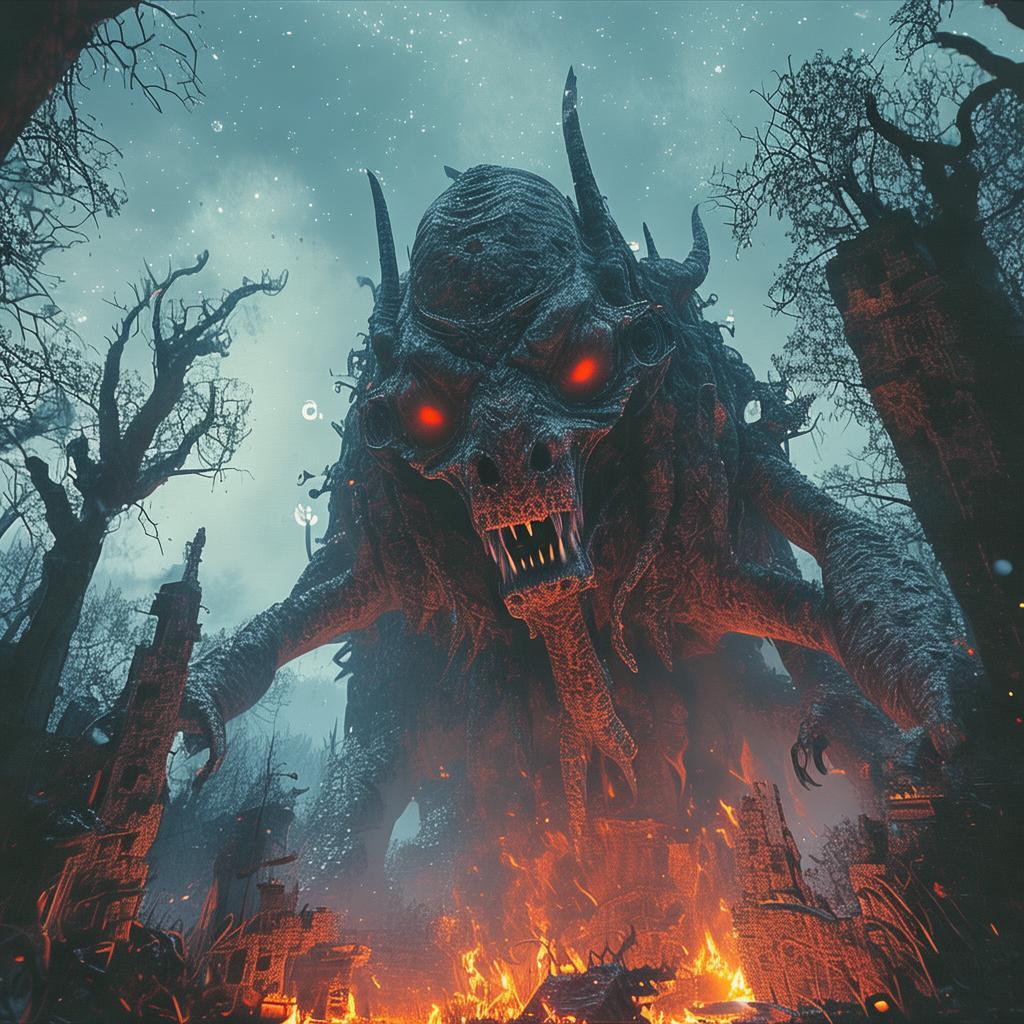The Melancholy of the Star-Crossed Idol
In the bustling metropolis of Elysium, where the neon lights of the music industry danced with the shadows of the night, there was a tale that would echo through the ages. It was a story of a young idol named Lysandra, whose voice was said to carry the essence of the ancient and forgotten gods of the Cthulhu Mythos. Her songs, chart-topping hits that seemed to seep into the very fabric of reality, spoke of stars, of the cosmos, and of a love that transcended time and space.
Lysandra's journey began in a small, forgotten town, where her grandmother had whispered tales of a mysterious melody that had once haunted her dreams. The melody, a haunting siren call, was said to be the voice of the ancient god Cthulhu, itself. Lysandra's grandmother had claimed that the melody was a gift, a curse, or perhaps both, and that it would one day lead her to her destiny.
As Lysandra grew, so did her talent. Her voice, once a soft whisper, now echoed through the halls of Elysium, reaching the ears of music producers and fans alike. Her first album, "The Melancholy of the Star-Crossed Idol," became an instant hit, with its ethereal melodies and lyrics that spoke of love, loss, and the cosmic dance of life and death.
The music industry was abuzz with talk of Lysandra's unique connection to the stars, her songs being as much a part of the night sky as the constellations themselves. Yet, beneath the surface, there was an unease. Lysandra's concerts were attended by figures who seemed to come from another world, their eyes hollow and their laughter a chilling echo of the melodies that Lysandra sang.
One night, during a performance, Lysandra felt a presence among the crowd. It was a figure cloaked in shadows, its eyes glowing with an otherworldly light. The figure approached the stage, and as it spoke, the words seemed to resonate with the very air around them.
"Welcome, Lysandra," the figure hissed. "You have been chosen to sing the song of Cthulhu, to awaken the ancient god from its slumber."
Panic set in as Lysandra realized the gravity of the situation. She had been singing about the stars, about the universe, and now it seemed that her very existence was a catalyst for something far more sinister. The figure vanished as quickly as it had appeared, leaving Lysandra alone on stage, her voice trembling as she sang the final verse of her song.
The following days were a whirlwind of activity. Lysandra's manager, aware of the figure's presence, sought to understand the true nature of the melodies that Lysandra sang. He delved into the Cthulhu Mythos, seeking answers that might save his protegee.
As he read the ancient texts, he discovered that the melodies were indeed a part of a forgotten ritual, one that had been lost to time. The ritual was designed to awaken the ancient deities, to bring them into the world of men. And Lysandra, with her voice and her destiny, was the key to this ancient ritual.

The manager approached Lysandra with the truth, but she was in denial. She could not bear the thought that her beloved songs could be a part of such a dark and sinister fate. Yet, as the days passed, the presence of the otherworldly figures grew stronger, and the melodies of Lysandra's songs began to change, taking on a more sinister tone.
The climax of the story came during a concert at the peak of Lysandra's fame. The crowd was in awe as she sang her final song, the one that would awaken Cthulhu. As the final note resonated through the air, the lights dimmed, and a figure emerged from the shadows, its eyes glowing with an ancient and terrifying light.
"Lysandra," the figure hissed, "you have done it. The god is awake."
The stage shook as the ancient god began to stir, its presence felt by all who were there. Lysandra, now understanding the gravity of her actions, attempted to sing the melody that would calm the beast, but it was too late. The crowd, now a sea of faces illuminated by the god's light, watched in horror as Cthulhu's form took shape, its tentacles writhing and its eyes glowing with a malevolent light.
The ending of the story left the reader with a sense of dread. Lysandra, now a part of the ancient mythos, was forced to live with the knowledge that her destiny was entwined with that of the great Cthulhu. The music industry had crumbled, the world itself seemed to be on the brink of chaos, and all because of a young idol's voice and the melodies that had once brought joy to the ears of many.
In the aftermath, Elysium was a ghost town, the once vibrant city now a silent witness to the power of the ancient gods. Lysandra, the Star-Crossed Idol, was gone, her fate a part of the Cthulhu Mythos, her legend a cautionary tale for those who dared to sing of the stars and the cosmos.
✨ Original Statement ✨
All articles published on this website (including but not limited to text, images, videos, and other content) are original or authorized for reposting and are protected by relevant laws. Without the explicit written permission of this website, no individual or organization may copy, modify, repost, or use the content for commercial purposes.
If you need to quote or cooperate, please contact this site for authorization. We reserve the right to pursue legal responsibility for any unauthorized use.
Hereby declared.









